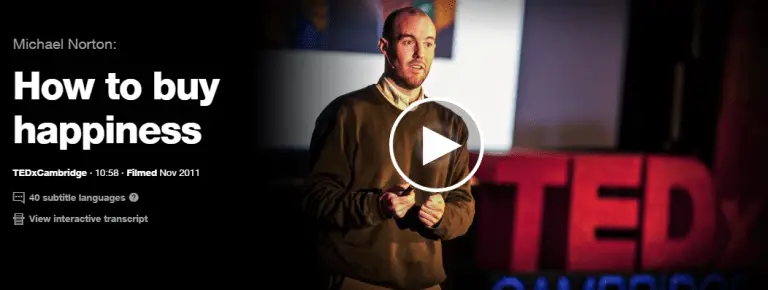January 27th, 2023
In a fascinating article that summarizes an important theme from his recent book, journalist Curtis White laments a particularly ominous aspect of contemporary post-modern, bourgeois, technocratic, scientistic, commercial culture, via a scathing critique of the popular media phenomenon, TED Talks, which have recently begun to serve as a platform for the corporate takeover of Buddhist spirituality. Like so many other facets of our world, he writes, TED Talks have emerged as a propaganda outlet for corporate interests and, along with so many other psychological, philosophical and spiritual traditions, entrepreneurial self-improvement gurus have lately co-opted and popularized Buddhist themes in the TED Talk arena. Adapted to free-market values in this way, Buddhist ideas have become less traditionally Buddhist and much more a new brand of motivational “think-and-grow-rich” pop psychology. TED Talk presenters, marketing these concepts to a secular western audience less interested in spiritual development and more interested in corporate advancement and material prosperity, combine corporate-speak with neuroscience and statistical data to proclaim a new ‘gospel of prosperity’. White describes TED Talk orator and popularizer of secular corporate Buddhism, Rick Hanson’s, project:
“what TED is really about is branding — thus “neurodharma,” the Rick Hanson brand. Like many another, Hanson aspires to be a charismatic entrepreneur engaged in expanding a market-based enterprise. This is what Danish scholar Jørn Borup calls “prosperity Buddhism,” marketing happiness to elites who can afford to buy their entrance into the path of enlightenment”
There certainly is an undeniably 21st century-affluent-bourgeois-entrepreneurial corporate-capitalist ambiance pervading TED Talk culture, one that seems awkwardly incongruous with the often ascetic and contemplative message of the world’s spiritual traditions (like Buddhism) that it attempts to engage. In an (candidly titled) article “Why I Hate Ted” Carin Moonin recalls how, like the unoriginal (and ironically uninspiring) cliche’s and exhortations to the kind of spiritual heights portrayed in motivational posters featuring mountain climbers and bungee-jumpers that festoon office cubicles around the world, TED Talk presentations
“remind me of every boring conference I’ve ever attended…. the time I wasted in conferences parked in a half-carpeted chair in frigid, unglamorous hotel ballrooms, watching pitchers of water that no one touched sweat all over free and cheesy branded notebooks while colleagues uh-huh-ed and nodded with no irony whatsoever…whilesome richly paid, self-satisfied douchebag sashaying in a headset, backed by meh-tacular slides, and ogled by the well-heeled…. finagles his way into an inelegant title, regaling a rapt, sheepy audience with “deliverables” and “stakeholders” and “ROI”
–This is an overly harsh indictment perhaps, but the similarities between TED Talks and business-conference presentations are telling. Indeed, like the now well-known Christian material-prosperity-gospel, preached in made-for-television church-services, the new Buddhist prosperity gospel in TED Talk forums presents a radical reimagining of the tradition’s worldview and message. Also like the Christian prosperity Gospel, this message is less a novel interpretation of the tradition and more a kind of expropriation and exploitation of key phrases and concepts from the tradition, used to serve the imperialistic agenda of its corporate proselytizers.
In a similar vein I’ve also explored how contemporary secular-scientific-commercial culture, despite its multicultural, open-minded, progressive pretensions, is often a covert — indeed, essentially unconscious— extension of industrial-era commercial imperialism by other means. Many Western philosophers, psychologists, and even Buddhist scholars, entranced by the intellectual simplicity of a reductive materialist scientism, and seduced by the professional rewards that the popular commercial-success message yields, find it easy to convince themselves, and their mass online audience, that the vague comparisons and superficial arguments advanced to legitimize their secular-capitalism-friendly Buddhism are convincing. Advocating a “naturalized” Buddhism (one that accepts only scientific claims and physical ‘facts’ as valid),
“modern western thinkers like Owen Flanagan, Susan Blackmore, Steven Batchelor and others… expropriate ideas from the Buddhist tradition that (when taken out of context and placed in a naturalistic paradigm) support an atheistic, scientific, and materialistic (in short, a ‘naturalized’ and ‘westernized’) version of Buddhism”
What these outwardly open-minded, multicultural, and often politically progressive spokesmen overlook though, is how this project perpetuates a long-standing colonial legacy whereby servants of western commercial interests use science as an instrument of imperial power: selectively plundering the intellectual resources of nonwestern wisdom-traditions to advance its own capitalist agenda. TED Talks that reduce Buddhist mindfulness to brain-function, and that describe Buddhist dharma in terms of “positive thinking”, or extol the ‘benefits’ of meditation for career success, are the latest iteration of this legacy. They conveniently ignore Buddhism’s metaphysics of transpersonal, immaterial consciousness and its quietist, anti-materialistic ethical ideals (ideals essential to its worldview, values and mission), while sifting through its scriptures and main tenets in order to extract some decontextualized Buddhist concepts and techniques for material profit and consumption. “American Buddhism didn’t have to go down this path”, White explains,
“The growth of Buddhism in the West began with the arts, especially poets like Blake, Whitman, and Thoreau (whose nickname was “the Concord Buddha”), followed by William Butler Yeats, Rainer Maria Rilke, and, later, Gary Snyder, Jack Kerouac, and the explosion of all things Eastern during the ’60s counterculture. But from the perspective of the corporate culture of that time and our own, the counterculture and its alien religions are threats in need of secularization. Like every contrary thing in corporate America, Buddhism needs to be managed”.
Indeed, western cultural critics from romantic-era poets to post- modern social psychologists have long recognized the devastating effects of science when it’s weaponized to serve predatory commercialism. Lamenting effects of industrialization in the 19th century Henry David Thoreau wrote that “We do not ride on the railroad; it rides upon us”. At the turn of the 20th century Max Weber warned about technology, industrialization and bureaucracy “disenchanting” human life— placing every aspect of experience into a “iron cage” of technocratic management. In the 20th century Martin Heidegger described modern industry and technology as “setting upon” and “enframing” the world as a resource for production…and in regard to the effects of the imperialistic science supporting this enframing, Albert Einstein famously commented:
“I believe that the horrifying deterioration in the ethical conduct of people today stems from the mechanization and dehumanization of our lives. A disastrous by-product of the development of the scientific and technical mentality. We are guilty. Man grows cold faster than the planet he inhabits.”
Minority-report protestations like these however, have proven incapable of stemming the steady emergence and predominance of a much more influential scientism and commercialism in both intellectual and popular culture. Early modern philosopher-mathematician Rene Descartes–in many ways the founding father of modern science and philosophy– celebrated the power of science to make humanity the “master and possessor” of nature, while his contemporary Francis Bacon described the mission of science in even more aggressive terms, stating that science would put nature “on the rack and torture her secrets from her.” 20th century pragmatist philosopher John Dewey celebrated the imperial ambitions of the scientific revolution’s founders, writing that, “Bacons watchword that knowledge is power and his dream of continuous empire over natural forces by means of natural science have been actualized. The Industrial Revolution by steam and electricity is the reply to Bacon’s prophecy”, and that society’s task is to “permit Baconian aspirations to come to a free and unhindered expression.” In the same spirit, late 19th-early 20th industrial engineer and corporate consultant Frederick Taylor’s enormously influential Principles of Scientific Management summarized this line of thought and applied it to modern industrial and professional life. It proudly proclaimed that efficient scientific management, though “directly antagonistic to the old idea that each workman can best regulate his own way of doing the work”, would productively subsume every facet of commercial life into its machinery.
—Hence, we are left with the fascinating ironic relationship we seem to find in popular TED Talks at the outset of the 21st century between corporate-capitalist-scientism, and the Buddhist spiritual tradition, whose jargon and selected bullet-points the former draws upon even while rejecting (or just ignoring) their deep ethical implications. TED Talk culture perpetuates western imperialism in a novel way— eschewing the overt violence of Enlightenment-Industrial era colonialism in favor of a much more covert and subtle colonization of the mind. Here, Buddhist ideology, and indeed all spiritual ideologies, are turned against themselves. White concludes
“TED talks is itself one cause of the suffering that TED’s audience is hoping a neuro-Buddha can fix for them! Conflating Buddhism with a science of happiness creates a perpetuum mobile of self-inflicted dukkha, suffering. Its final meaning is, “I can be happy while keeping my wealth and a scientific world view. I can be a Buddhist without actually having to change.” From a properly Buddhist perspective, this is a delusion.”
Of course, all these cultural trends—scientism, the secularization of Buddhism, and the dull disenchanted corporate-speak of TED Talks— are much less significant in-themselves than for what they represent, and for what all the neo-romantic, dissident thinkers above feared: the gradual devaluation and commodification of human life and the spiritual impoverishment of the world. ‘Frankfort School’ psychologist Eric Fromm researched and wrote extensively about the “marketing orientation” mentality extending far beyond the commercial world to pervade the human condition at large. “Thinking as well as feeling is determined by the marketing-orientation.” He observed, “Man living in a market economy, feels himself to be a commodity. He is divorced from himself as the seller of a commodity is divorced from what he wants to sell”, Indeed,
“While his scientific power grows, he is more and more powerless in his life and society. While creating new and better means for mastering nature, he… has lost the vision of the end which alone gives them significance—man himself.”
This is a cogent insight indeed. Presenting Buddhist philosophy as a protest against contemporary bourgeois values and scientism would certainly offer a more accurate application of Buddhist dharma than what popular TED Talk culture seems prepared to concede ….if they can (or even want) to see it this way…
We hope you enjoy our articles. Please note, we may collect a share of sales or other compensation from the links on this page. Thank you if you use our links, we really appreciate it!



